The price of perfection is infinite.
The View from Halfway Down
“
The weak breeze whispers nothing
The water screams sublime
His feet shift, teeter-totter
Deep breath, stand back, it’s time
Toes untouch the overpass
Soon he’s water bound
Eyes locked shut but peek to see
The view from halfway down
–
A little wind, a summer sun
A river rich and regal
A flood of fond endorphins
Brings a calm that knows no equal
You’re flying now
You see things much more clear than from the ground
It’s all okay, it would be
Were you not now halfway down
–
Thrash to break from gravity
What now could slow the drop
All I’d give for toes to touch
The safety back at top
But this is it, the deed is done
Silence drowns the sound
Before I leaped I should’ve seen
The view from halfway down
I really should’ve thought about
The view from halfway down
I wish I could’ve known about
The view from halfway down
“
BoJack Horseman: Season 6, Episode 15 – The View from Halfway Down
“You asked for my hustle, I gave you my heart – because it came with so much more.”
Nostalgia For A Time You’ve Never Known
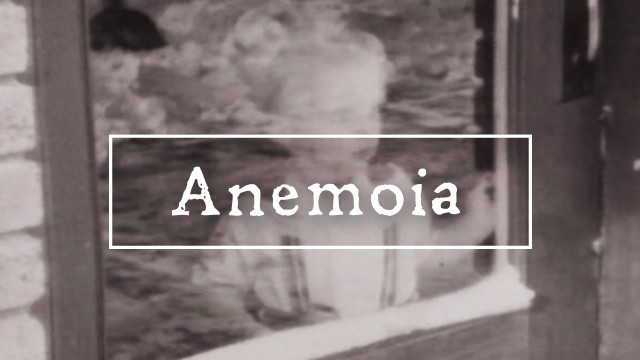
“
There’s an old saying, ‘The past is a foreign country: they do things differently there.’
Looking at old photos its hard not to feel a kind of wanderlust-a pang of nostalgia for times you’ve never experienced. To sit on the side of the road and watch the locals passing by. Who lived and died before any of us arrived here. Who sleep in the same houses we do, who look up at the same moon, who breathe the same air, the same blood in their veins. And live in a completely different world.
It’s a world still covered in dust from the frontier. A world of adults whose lives are hammered out by hand. A world of front porches, of fires to light in the evening, of conversations over a fence.
You’d watch as they carry on with their lives, that seem so important. Even if their story has already been told. Even if none of it risks turning out any other way but the way it happened. But they carry on anyway.
The past is a foreign country, and we’re only tourists. We can’t expect to understand the locals, or why they do what they do. We can only ask them to hold still, so we can capture a photo to take home with us. So we can sit for a few minutes in a world of black and white, with clean borders that protect us from the rush of time.
Like a tide-pool just out of the reach of the waves, that lets you linger in the moment. So clear and still, you can see your own reflection.
“
— The Dictionary of Obscure Sorrows
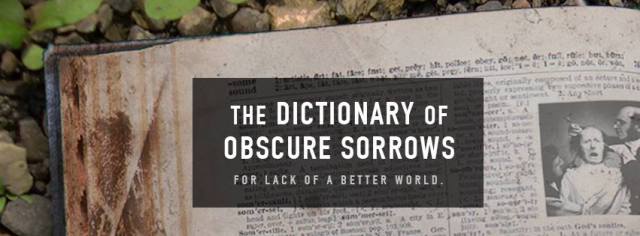
The Fear That Everything Has Already Been Done

“
You are unique. And there are seven billion others, just as unique as you. Each of us is different, with some new angle on the world. But what does it mean if the lives we’re busy shaping by hand, all end up looking the same-easily replaced by a thousand identical others?
So we all spread out, looking for scraps of frontier, trying to capture something special, something personal. As if we’re afraid of being captured ourselves-so quickly pegged for exactly what we are-so easily mistaken for someone ordinary, just like everyone else.
It should be a comfort that we’re not so different, that our perspectives so neatly align, that these same images keep showing up, again and again. It’s alright if we tell the same jokes we’ve all heard before, it’s alright if we keep remaking the same movies, it’s alright if we keep saying the same phrases to each other, as if they had never been said before.
‘The powerful play goes on, and you will contribute a verse.’ You and I and seven billion others will leave our mark on this world we’ve inherited. But if, in the end, we find ourselves with nothing left to say, nothing new to add, idly tracing outlines left by others long ago, it will be as if we weren’t here at all.
This too has been said many times before. ‘The powerful play goes on.’ And when you get your cue, you say your line.
“
— The Dictionary of Obscure Sorrows

The Realization That Everyone Has A Story
“
You are the main character-the protagonist-the star at the center of your own unfolding story. You’re surrounded by your supporting cast: friends and family hanging in your immediate orbit.
Scattered a little further out, a network of acquaintances who drift in and out of contact over the years.
But there in the background, faint and out of focus, are the extras. The random passersby. Each living a life as vivid and complex as your own.
They carry on invisibly around you, bearing the accumulated weight of their own ambitions, friends, routines, mistakes, worries, triumphs and inherited craziness.
When your life moves on to the next scene, theirs flickers in place, wrapped in a cloud of backstory and inside jokes and characters strung together with countless other stories you’ll never be able to see. That you’ll never know exists.
In which you might appear only once. As an extra sipping coffee in the background. As a blur of traffic passing on the highway. As a lighted window at dusk.
“
The Warfare of Genghis Khan
Josh: You hate that I’m interested in this.
Donna: What was your first hint?
Josh: That’s perfect, sit down. Sit. I need to play out an argument. Everyone hates us —
Donna: Inspiring start.
Josh: — we’re the most dominate nation on Earth, but too often the face of our economic superiority is in corporate imperialism or technological dominance shown by smart bombs and predator drones. We could do something else. Something generous and uplifting – for all humankind. We could send the first representatives from Earth to walk on another planet. We could land people on Mars… Needs work.
Donna: Needs something.
Josh: Yeah that, inspiration thing… Voyager, in case it’s ever encountered by extraterrestrials, is carrying photos of life on Earth, greetings in fifty-five languages and a collection of music; from Gregorian chants to Chuck Berry. Including, “Dark Was the Night, Cold Was the Ground,” by twenties blues man Blind Willie Johnson, whose stepmother blinded him at seven by throwing lye in his eyes after his father beat her for being with another man. He died, penniless, of pneumonia after sleeping bundled in wet newspapers in the ruins of his house that burned down. But his music just left the solar system.
Donna: OK… That got me.
Cosmic Poetry
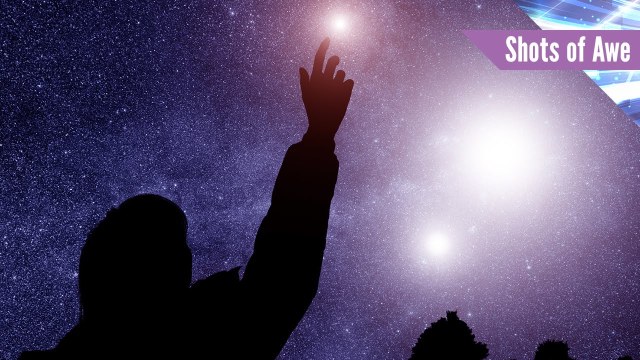
“
So for human beings, existential angst stems from the fact that we are creatures of meaning. We are creatures of purpose, we are creatures of myth. We want to feel like there is a destiny to our lives, like there is a reason why we are here.
And we’ve tried to address this existential itch, this agitation through the creation of beautiful stories, beautiful myths. We’ve created narrative threads, religions, systems of thought, that have placed the body-mind in a larger context. That have made us feel like we are part of something greater than ourselves. This is hugely important.
But what are we ultimately, when you break it down, when you shatter the myths, what are we left with? And I read a great quote recently that said that actually, “We are dead stars looking back at ourselves.”
I mean when you consider we look upon the heavens, we have the Hubble Space Telescope blasting new tunnels between the mind and the other, as Ross Anderson says, and we look back and we are the remnants of the those stars that died. The periodic table of the elements, all of it was manufactured in the furnaces of stars. So we are dead stars, looking back at our selves.
I mean this idea is just astonishing, we are poetry.
We are cosmic poetry.
“
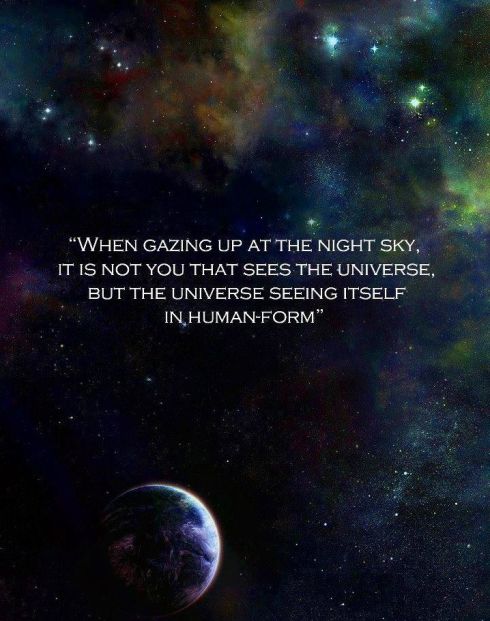
Transcript from a video by Shots of Awe with JASON SILVA
“Be Grateful, and Keep Smiling: Christmas 2018” By JockoWillink
“
Dear Bill,
Today is February 13th, 1984. I came to this black wall again, to see and touch your name. And as I do, I wonder if anyone ever stops to realize that next to your name, on this black wall, is your mother’s heart. A heart broken fifteen years ago today, when you lost your life in Vietnam.
And as I look at your name, William R. Stocks, I think of how many, many times I used to wonder how scared and homesick you must have been in that strange country called Vietnam. And if, and how it might have changed you; for you were the most happy-go-lucky kid in the world. Hardly ever sad or unhappy. And until the day I die I will see you as you laughed at me, even when I was very mad at you, and the next thing I knew we were laughing together.
But on this passed New Year’s Day I had my answer. I talked by phone to a friend of yours from Michigan who spent your last Christmas and the last four months of your life with you. Jim told me how you died. For he was there and saw the helicopter crash. He told me how you had flown your quota and had not been scheduled to fly that day. How the regular pilot was unable to fly and had been replaced by someone with less experience. How they did not know the exact cause of the crash. How it was either hit by enemy fire, or that they hit a pole, or something unknown. How the blades went through the chopper and hit you. How you lived about a half hour, but were unconscious, and therefore did not suffer. He said how your jobs were like sitting ducks. They would send you men out to draw the enemy into the open, and then they would send in the big guns and planes to take over.
Meantime, death came to so many of you. He told me how, after a while over there, instead of a yellow streak, the men got a mean streak down their backs. Each day the streak got bigger, and the men became meaner… everyone but you Bill. He said how you stayed the same, happy-go-lucky guy that you were when you arrived in Vietnam. How your warmth and friendliness drew the guys to you. How your Lieutenant gave you the nickname of “Spanky.” And soon your group, Jim included, were all known as “Spanky’s Gang.” How when you died, it made it so much harder on them, for you were their moral support. And he said how you of all people should never had been the one to die.
Oh god, how it hurts to write this. But I must face it and then put it to rest. I know that after Jim talked to me he must have relived it all over again and suffered so. Before I hung up the phone I told Jim I loved him. Loved him for just being your close friend, and for sharing the last days of your life with you, and for being there with you when you died. How lucky you were to have him for a friend. And how lucky he was to have had you.
Later that same day I received a phone call from a mother in Billings, Montana. She had lost her daughter, her only child, a year ago. She needed someone to talk to, for no one would let her talk about the tragedy. She said she had seen me on television on New Year’s Eve after the Christmas letter I wrote to you and left at this memorial had drawn newspaper and television attention. She said she had been thinking about me all day and just had to talk to me. She talked to me of her pain, and seemingly needed me to help her with it.
I cried with this heart broken mother. And after I hung up the phone I laid my head down and cried as hard for her. Here was a mother calling me for help with her pain over the loss of her child, a grown daughter. And as I sobbed I thought, ‘How can I help her with her pain, when I have never completely been able to cope with my own?’
They tell me the letters I write to you and leave here at this memorial are waking others up to the fact that there is still much pain left after all these years from the Vietnam War. But this I know: I would rather to have had you for twenty-one years, and all the pain that goes with losing you, then never to have had you at all.
— Mom
And that was a letter written by Mrs. Eleanor Wimbish, Mother of Sgt. William R. “Spanky” Stocks, from Glen Burnie, Maryland. Who was killed in action in a helicopter crash in Vietnam on February 13th, 1969. That letter was one of many that she has written and places beneath panel 32. Where his name is etched into the Vietnam Memorial Wall, along with more than fifty-eight thousand other names, of our fallen heroes.
And I read an interview with Mrs. Wimbish from 1990. And in that interview she said, ‘When my son died I wrote my pledge. I said “I will not now or ever let people forget.”‘ So — for Mrs. Wimbish, and her son, Bill “Spanky” Stocks, during this holiday season let us all remember. Remember the service, and supreme sacrifice of so many. And also, let us learn some important lessons from Mrs. Wimbish and from her son. From Mrs. Wimbish we learn to be thankful for what we have had. Even if it is lost, and even if that loss causes pain still: be thankful. And from her son Bill, we can learn that even in the face of horror and death, we can maintain our warmth and our friendliness. And that that warmth and friendliness can guide and support others, can help bolster the spirit of those around you, by simply smiling.
So, as we celebrate the holidays, let us be thankful for what we have. And like Sergeant William Bill “Spanky” Stocks, keep smiling. Have a Merry Christmas, and a Happy New Year.
“
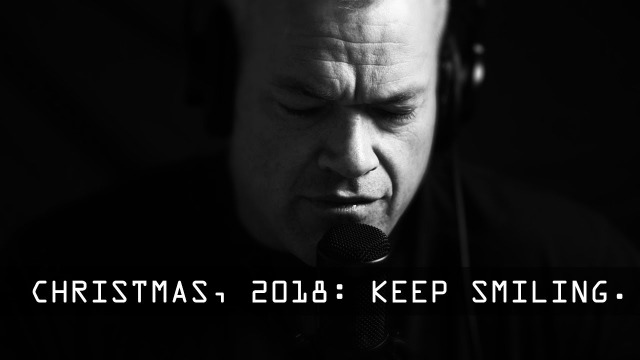
The above is a transcript of the audio from a video titled “Be Greatful, and Keep Smiling: Christmas 2018” uploaded by Jocko Podcast. I do not own the rights to the video nor have gotten permission from Jocko. I simply heard that and had to share. I get and want nothing from this, other than a warmer heart from that spectacular letter and message.
Tom MacDonald – “Anxiety” SPOKEN WORD
I wake up feeling panicked, my pills are in the cabinet
It takes all the strength I have to just ignore them as I pass it
Man I hope this feeling passes soon – been hell and back its barely noon
I’m scared to go outside, shit I’m surprised I even left my room
And it feels like no one understands how bad I’d love to join my friends
It’s hard to breathe I’m anxious and I end up staying home instead
The doctor hasn’t helped me much, he signs his name I buy the drugs
I’m feeling weird I take one out it makes me feel comfortably numb
Man I can’t handle my emotions like I used to its all different now
I start to sweat I feel confused my fingers shake my heartbeat pounds
I’m feeling claustrophobic every time the closet closes ’cause my skeletons are in there so I have to leave it open
I’m just nervous over nothing even shit I can’t control
I used to love to be in public now I’d rather be alone
Even though its difficult its probably for the best
If I didn’t make a change I would of drank myself to death
Then I wake up feeling better than I did the day before
But then it hits me out of nowhere and almost knocks me to the floor
A heaviness, a readiness to get back into bed
A sadness that I can’t explain a cloud over my head
My deepest darkest fears feel like they’re filling up an ocean and I’m floating on the surface with no hope to keep me going
I’ve been down on myself, man I forgot how to believe in me
I never asked for help nah I just struggle with it secretly
I wish that it was something I could sweep under the carpet
Trying to hide it all the time only makes the battle harder
Man I lived a lot of moments that I probably should have cherished
Now they seem so far away from me I’m angry and embarrassed
I can’t even tell my parents they don’t need to keep on worrying
My mama and my papa don’t deserve to have to bury me
I hope the pills I have will hold me over for a while
I’ll keep searching for the strength to find my smile.
Tom MacDonald – “Anxiety” SPOKEN WORD





